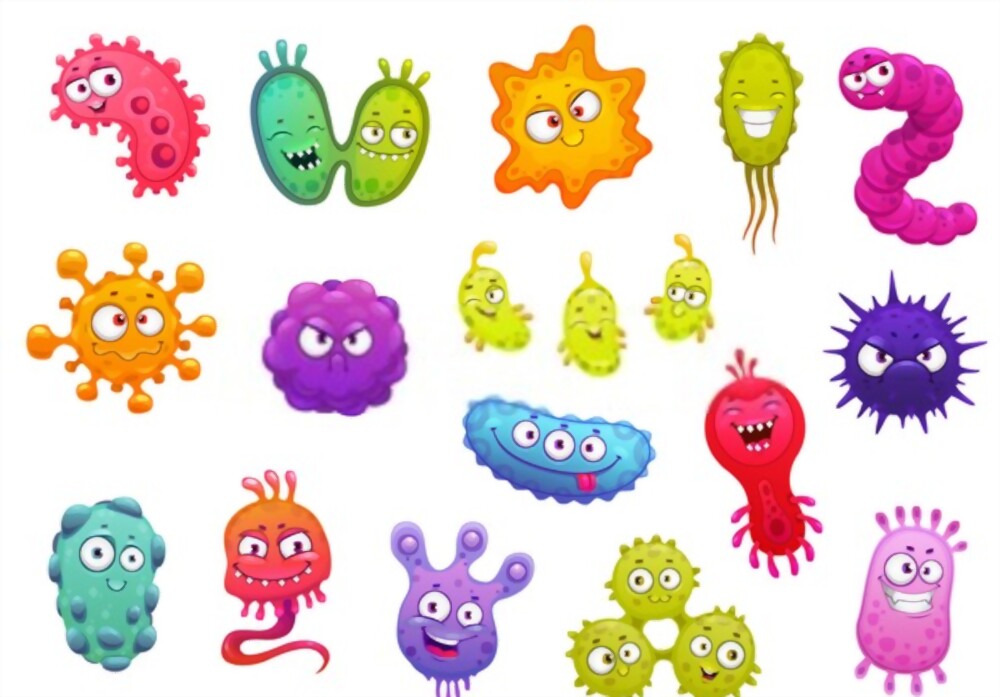Essential oils are obtained by steam distillation from leaves, flowers, stems and other parts of plants. They have a very complex chemical composition. The main components make up 70% of the composition: these are terpenes, terpenoids and phenylpropanoids. The remaining 30% contains many other compounds such as fatty acids, oxides, sulfur derivatives, etc.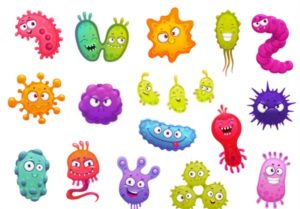
Essential oils have been used for a long time and are used in our time to combat bacterial and viral pathogens.
All over the world there is a big problem now – the rapidly growing resistance of microorganisms to antibiotics. The mortality rate from infectious diseases is quite high. Lower and upper respiratory tract infections remain the fourth leading cause of death in the world, and the first among infectious diseases. According to a WHO report, resistance to commonly prescribed drugs has been identified in Klebsiella pneumoniae, Escherichia coli, Staphylococcus aureus, Streptococcus pneumoniae and Salmonella sp.
Antibiotic resistance is developed in microorganisms due to the uncontrolled use of these antibiotics. At the same time, viruses sometimes lead to such pathologies, in front of which modern medicine is powerless. To date, the COVID-19 virus has already claimed more than 1.5 million lives.
The classic medical responses to these infections are very limited, so essential oils are a useful finding in the treatment of viral diseases. They have not only antiviral and antimicrobial properties, but also anti-inflammatory, antineoplastic, analgesic, and can also affect the immune system.
All essential oils, subject to the rules of use, do not have negative side effects and do not cause imbalances in physiological processes in the body. The aggressiveness of essential oils in relation to microbes and viruses is combined with their complete harmlessness to the human body. This is how they differ from antibiotics. It is also important to note that microorganisms do not develop resistance to essential oils, which allows them to be used for a long time without unwanted side effects.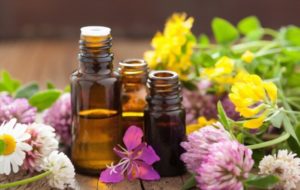
In studies of essential oils, it was found that the most effective oils that eradicate infections have the same compounds in their composition:
1.Phenols, among which thymol and eugenol are extremely powerful antibacterial substances, which also have powerful antifungal properties.
2.Cinnamaldehyde is a powerful anti-infection agent
3.Monoterpenes such as menthol, geraniol, terpineol and others – bactericidal agents
4.Aldehydes such as citral (geranial, neral) are important antibacterial substances
5.Ketones such as camphor, carvone, mentone, krypton – anti-infectious agents
6.Oxides, especially 1,8-cineole, are an important anti-infective and lymphatic tonic.
Knowing the chemical composition of the essential oil, you can opt for some of them. Note that when choosing an essential oil, you should pay attention to the quality of the product. For medical purposes, choose 100% pure, no additives, natural, essential oils. We will take a look at the effects of certain essential oils on human health.
Peppermint essential oil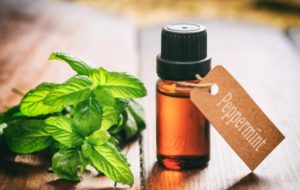
Main components: menthol (up to 55%) and menthone (up to 32%)
Properties: Although the main use of peppermint oil is more associated with its pleasant aroma, the high menthol content guarantees high antimicrobial activity. The use of peppermint essential oil has been shown to suppress inflammation. This oil has antibacterial activity against respiratory pathogens such as S. pneumoniae and Streptococcus. In tests, peppermint essential oil has also demonstrated activity against herpes simplex virus (HSV-1 and HSV-2).
Another benefit of peppermint oil is that it enhances the effects of other essential oils or medicinal substances. The spectrum of action of peppermint oil is quite large. It has antioxidant properties, reduces pain, calms the nervous system, relieves swelling, removes excess water from the body, and promotes the outflow of bile. Peppermint essential oil is also useful for brain function: it increases concentration and efficiency, and reduces headaches.
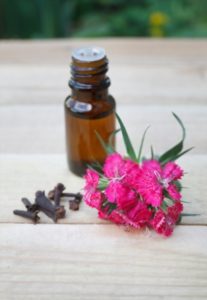 Clove essential oil
Clove essential oil
Main component: eugenol (30-95% depending on the origin of the oil)
Properties: Due to the high content of eugenol, this oil is active against the herpes simplex virus (HSV-1 and HSV-2), and additional studies have revealed that eugenol enhances the action of a popular antiviral drug. Clove oil, with its antimicrobial properties, has been shown to be more effective against pathogenic strains such as Aeromonas hydrophila (which can cause dysentery gastroenteritis), the causative agent of Candida albicans (which causes fungal infections such as athlete’s foot, thrush and vaginal yeast infections), Proteus mirabilis (which causes most human infections), S. pneumoniae and H. influenzae (common respiratory pathogens), Moraxella catarrhalis (causes lower respiratory tract infections, resistant to common antimicrobial agents). Clove essential oil is effective against influenza A (H1N9) virus. As an antimicrobial agent, clove essential oil helps to normalise the digestive system, it is used to treat various infections of the intestines, genitourinary system and respiratory system – laryngitis, tracheitis, sinusitis and bronchitis.
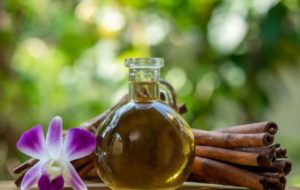 Cinnamon essential oil
Cinnamon essential oil
Main component: brown aldehyde, eugenol
Properties: Cinnamon oil is similar in properties to clove oil, as they contain the same element eugenol. Often in ongoing research, these oils are tested simultaneously. Due to the content of eugenol and cinnamaldehyde, cinnamon oil is a very effective antibacterial, antimicrobial, antifungal and general tonic. Cinnamaldehyde is active against infections, so cinnamon essential oil is useful for respiratory infections such as influenza and pneumonia. It is also used to treat fungal infections of the skin.
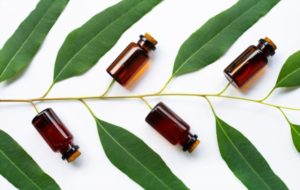 Eucalyptus essential oil
Eucalyptus essential oil
Main component: eucalyptol (1,8-cineole) not less than 70%, limonene.
Properties: Due to its high content of 1,8-cineole, eucalyptus essential oil is active against herpes simplex virus, against mumps virus and against influenza A H1N1 virus (so-called “swine flu”). It also has an antimicrobial effect on Mycobacterium tuberculosis, the causative agent of tuberculosis, and on Staphylococcus aureus (Staphylococcus aureus). Furthermore, eucalyptus essential oil is active against bacteria such as P. gingivalis that cause dental diseases such as periodontitis. Therefore, eucalyptus oil is often used in oral hygiene products. Eucalyptus essential oil acts at the level of well known antibiotics against pathogenic bacteria of the respiratory tract
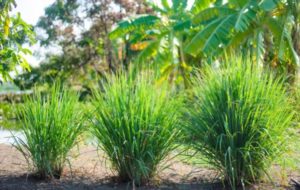 Lemongrass essential oil
Lemongrass essential oil
Main component: geranial (48-54%) and neral (29-33%)
Properties: Due to the presence of citral aldehydes (geranial and neral), this oil has shown extraordinary activity against influenza A (H1N1) virus and is also the most effective against herpes simplex virus HSV-1. This oil helps fight well-known bacteria such as E. coli (Escherichia coli), S. aureus (Staphylococcus aureus) and many others. At the same time, it has an antifungal effect.
Tea tree essential oil
Main component: terpinen-4-ol, 1,8-cineole
Properties: Thanks to the above main components, tea tree essential oil is effective against influenza A viruses (H11N9 and H1N1) and herpes simplex (HSV-1 and HSV-2). Shows antibacterial activity against bacteria such as E. coli (Escherichia coli), S. aureus (Staphylococcus aureus), S. epidermidis, H. influenzae, S. pneumonia and many others. WHO recommends the use of this oil on the basis of confirmed clinical data at a recommended concentration of 5-100% for topical use in the treatment of skin conditions such as acne, lichen of the feet, mycosis of the nails, vaginitis, cystitis and as an antiseptic and disinfectant for the treatment of wounds.
How to apply essential oils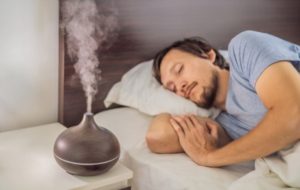
For prophylactic purposes and for the treatment of acute respiratory infections, aromatherapy has recently become increasingly important. This is a method of treatment which consists of exposing the human body to essential oils, in the form of inhalation through the respiratory tract or in the form of a compress, massage or bath directly through the skin. Aromatherapy is the art of treating diseases with essential oils, the healing power of which is aimed at improving the physical and mental health of a person. Aromatherapy cannot replace classical medicine, but the use of essential oils helps and complements medical treatment.
Methods for using essential oils:
- To ease coughing, rub your chest and throat with a mixture of essential oil and base oil and wrap yourself in something warm. This procedure can be repeated several times a day.
- For a runny nose and its prevention, apply a mixture of oils to the nose wings. Surprisingly, a runny nose goes away in one day, without drops and sprays, which, by the way, also contain essential oils.
- For inhalation, add a few drops of essential oil to a bowl of hot water and inhale the steam.
- For massage, mix an essential oil or a mixture of essential oils with a base oil.
- For a compress, add 3 drops of essential oil to 1 glass of warm water, moisten a cotton cloth and apply to the sore spot for half an hour, put plastic wrap and a warm cloth on top of the compress.
- To disinfect the air, use a diffuser with a few drops of essential oil added
- For an aroma bath, mix the essential oil with the base oil and add it to the water.
It is important to remember the basic rules for using essential oils:
- Do not apply pure essential oil directly to the skin, it should be diluted in vegetable oil. The base oil can be jojoba oil, almond oil, coconut oil, black cumin oil.
- Before using any essential oil, it is necessary to conduct a sensitivity test. To do this, apply an essential oil or a mixture to the inside of the elbow and observe the reaction. If there is no redness or shortness of breath, then the oil can be applied.
- Do not use during pregnancy
In conclusion, most treatment options for upper respiratory infections are about symptom relief. Essential oils have shown their antimicrobial and antiviral efficacy for centuries. The safety of essential oils makes them a great choice for the health of yourself and your loved ones.
